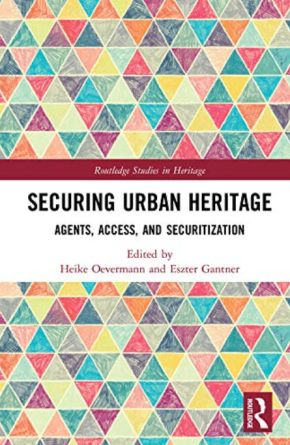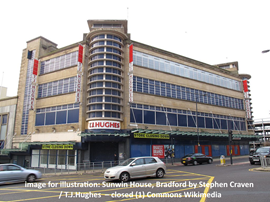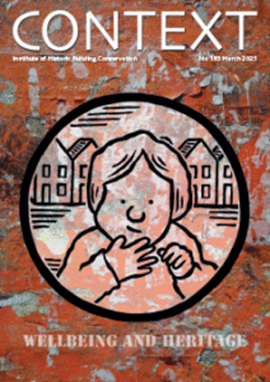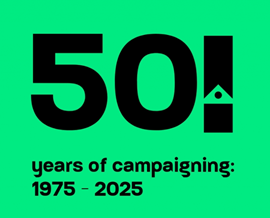Securing Urban Heritage: agents, access, and securitization
Securing Urban Heritage: agents, access, and securitization, Edited by Heike Oevermann and Eszter Gantner, Routledge, 2019, 216 pages, 25 illustrations in black and white.
What is this book? Is it about urban conservation, making historic spaces safe in troubling times, or ensuring broad access to the historic environment for a range of different groups with different purposes? This slim but dense academic volume of essays takes on the ambitious challenge of bringing these three different themes into a coherent whole with a broad selection of cases from across the globe.
For the Anglo-Saxon practitioner, the reader has first to work through language and terminology that will be unfamiliar, occasionally confusing and frequently multi-layered in its meaning. For European colleagues, more used to working with academia and translating seemingly nebulous concepts into practical projects, the book will provide helpful insights, but its breadth of ambition counterintuitively limits its use.
On a grander scale, the book does plough a furrow into which future seeds will be planted. A great deal of further work is needed on sustainable approaches to urban conservation, in particular on fundamental questions around how it can be effectively integrated into city management (and, in a UK context, on how this benefits municipalities that have been pared to the bone by a decade of austerity).
The nearest this volume comes to addressing that question is, first, in the case study concerning Kyoto City and Osaka. In spite of concepts of impermanence in Japanese approaches to conservation, it notes that conservation is, in effect, integrated into the country’s culture. Second, a number of the contributions touch on the question of values – an approach which creates opportunities for cross-cutting objectives. Although the case study concerning urban nuclear reactors is perhaps somewhat extreme, it neatly encapsulates the challenges around changing values and related uses, while Dennis Rodwell considers values-based conservation in more everyday situations. The case study of St Denis in northern Paris starts to tackle the challenge of how engaging with dissonant heritage narratives can create misunderstanding and, if poorly handled, end up excluding rather than including.
To this reviewer, the book cannot succeed in its aim of bringing together questions of conservation, access and actors into a coherent framework – perhaps because of the ambition and diversity of the case studies, or because of the inaccessible language, which caters to an academic audience. The result is a series of complex and somewhat convoluted arguments that are worth dipping in to when the reader has time and space to carefully consider what lessons might be drawn for their particular context. But for the often harassed local authority officers attempting proactively to shape conservation within their areas, this is possibly too much to ask.
This article originally appeared as ‘Convoluted arguments’ in IHBC's Context 163 (Page 57), published by The Institute of Historic Building Conservation in March 2020. It was written by Adam Wilkinson, director, Edinburgh World Heritage.
--Institute of Historic Building Conservation
Related articles on Designing Buildings Wiki
IHBC NewsBlog
Old Sarum fire in listed (& disputed) WW1 Hangar - Wiltshire Council has sought legal advice after fire engulfed a listed First World War hangar that was embroiled in a lengthy planning dispute.
UK Antarctic Heritage Trust launches ‘Virtual Visit’ website area
The Trust calls on people to 'Immerse yourself in our heritage – Making Antarctica Accessible'
Southend Council pledge to force Kursaal owners to maintain building
The Council has pledged to use ‘every tool in the toolbox’ if urgent repairs are not carried out.
HE’s Research Magazine publishes a major study of the heritage of England’s suburbs
The article traces the long evolution of an internal programme to research 200 years of suburban growth
IHBC Context 183 Wellbeing and Heritage published
The issue explores issues at the intersection of heritage and wellbeing.
SAVE celebrates 50 years of campaigning 1975-2025
SAVE Britain’s Heritage has announced events across the country to celebrate bringing new life to remarkable buildings.
IHBC Annual School 2025 - Shrewsbury 12-14 June
Themed Heritage in Context – Value: Plan: Change, join in-person or online.
200th Anniversary Celebration of the Modern Railway Planned
The Stockton & Darlington Railway opened on September 27, 1825.
Competence Framework Launched for Sustainability in the Built Environment
The Construction Industry Council (CIC) and the Edge have jointly published the framework.
Historic England Launches Wellbeing Strategy for Heritage
Whether through visiting, volunteering, learning or creative practice, engaging with heritage can strengthen confidence, resilience, hope and social connections.















